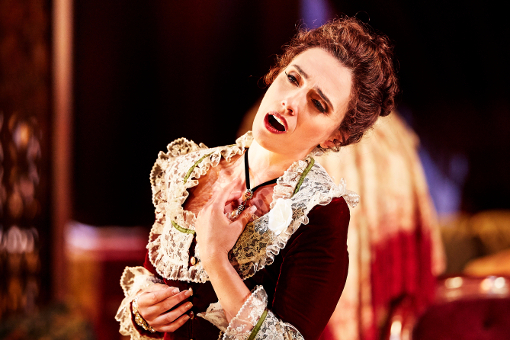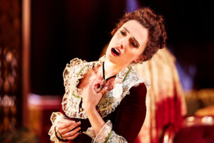"Of course it was such a huge risk, but Peter Gelb and the Metropolitan believed in me, so I understood I should help them," she said in a telephone interview Friday.
Gelb had only hours to find a replacement Violetta after Italian soprano Carmen Giannattasio was struck by allergies and left unable to sing.
Peretyatko-Mariotti had sung Violetta before, but not in more than a year and never in the Met's production, which features a stripped-down set dominated by a giant clock that reminds the audience of Violetta's final, devastating fate.
Peretyatko-Mariotti, 36, is a rising star in opera, expert in vocal acrobatics that dominate the works of Rossini and other early 19th century Italian composers. Those attributes are also required of a soprano in the early stages of "La Traviata."
The role is considered one of the toughest in the repertoire because of the character's dramatic transformation and near-constant presence on stage.
Peretyatko-Mariotti confessed to a bout of nerves before the show, but said she was too focused on the conductor and stage directors to be panicked during the performance.
"I just tried to forget everything and then tried to stay in tempo with the maestro," she said.
The heart of the piece occurs in the second act in Violetta's confrontation with Giorgio Germont, played by Domingo, who bullies the former courtesan Violetta into leaving Germont's son, Alfredo.
Violetta ultimately dies of consumption, but her fate has also been seen as caused by the "stupid rules of society," as Peretyatko-Mariotti put it.
"If you try to be the real Violetta, you react in the most natural way, it doesn't matter what the staging is," she said. "That's the key."
- 'More of a gamble' -
Peretyatko-Mariotti said she fed off the audience which had been prepped by Gelb before the overture of the circumstances of her appearance, including the fact that she was recovering from jet lag. Many attendees later thanked the singer of her Facebook page.
"You can't imagine this energy that I felt from the audience because everyone knew what was happening," she said. "This vibration. You can touch that. And maybe that's why I said 'yes.'"
Gelb said the Met keeps understudies on hand, but opts for more established singers like Peretyatko-Mariotti when possible, which is a "more of a gamble" but can have a bigger payoff.
"It makes you realize how extraordinary things can be sometimes in live performance," he said.
"Singing on the stage of the Met in any production is kind of an exercise in baring your soul and art to the public, but this one even more so because it is so stripped down," Gelb said.
Peretyatko-Mariotti said she was looking forward to seeing Giannattasio return to her part Friday, but would do vocal exercises ahead just in case.
Told of this, Gelb laughed and said Giannattasio was feeling better, but added, "It's always good to know Olga will be there."
----------------------------------------------------------------------------------------------------------------------------
Gelb had only hours to find a replacement Violetta after Italian soprano Carmen Giannattasio was struck by allergies and left unable to sing.
Peretyatko-Mariotti had sung Violetta before, but not in more than a year and never in the Met's production, which features a stripped-down set dominated by a giant clock that reminds the audience of Violetta's final, devastating fate.
Peretyatko-Mariotti, 36, is a rising star in opera, expert in vocal acrobatics that dominate the works of Rossini and other early 19th century Italian composers. Those attributes are also required of a soprano in the early stages of "La Traviata."
The role is considered one of the toughest in the repertoire because of the character's dramatic transformation and near-constant presence on stage.
Peretyatko-Mariotti confessed to a bout of nerves before the show, but said she was too focused on the conductor and stage directors to be panicked during the performance.
"I just tried to forget everything and then tried to stay in tempo with the maestro," she said.
The heart of the piece occurs in the second act in Violetta's confrontation with Giorgio Germont, played by Domingo, who bullies the former courtesan Violetta into leaving Germont's son, Alfredo.
Violetta ultimately dies of consumption, but her fate has also been seen as caused by the "stupid rules of society," as Peretyatko-Mariotti put it.
"If you try to be the real Violetta, you react in the most natural way, it doesn't matter what the staging is," she said. "That's the key."
- 'More of a gamble' -
Peretyatko-Mariotti said she fed off the audience which had been prepped by Gelb before the overture of the circumstances of her appearance, including the fact that she was recovering from jet lag. Many attendees later thanked the singer of her Facebook page.
"You can't imagine this energy that I felt from the audience because everyone knew what was happening," she said. "This vibration. You can touch that. And maybe that's why I said 'yes.'"
Gelb said the Met keeps understudies on hand, but opts for more established singers like Peretyatko-Mariotti when possible, which is a "more of a gamble" but can have a bigger payoff.
"It makes you realize how extraordinary things can be sometimes in live performance," he said.
"Singing on the stage of the Met in any production is kind of an exercise in baring your soul and art to the public, but this one even more so because it is so stripped down," Gelb said.
Peretyatko-Mariotti said she was looking forward to seeing Giannattasio return to her part Friday, but would do vocal exercises ahead just in case.
Told of this, Gelb laughed and said Giannattasio was feeling better, but added, "It's always good to know Olga will be there."
----------------------------------------------------------------------------------------------------------------------------









 Home
Home Politics
Politics











